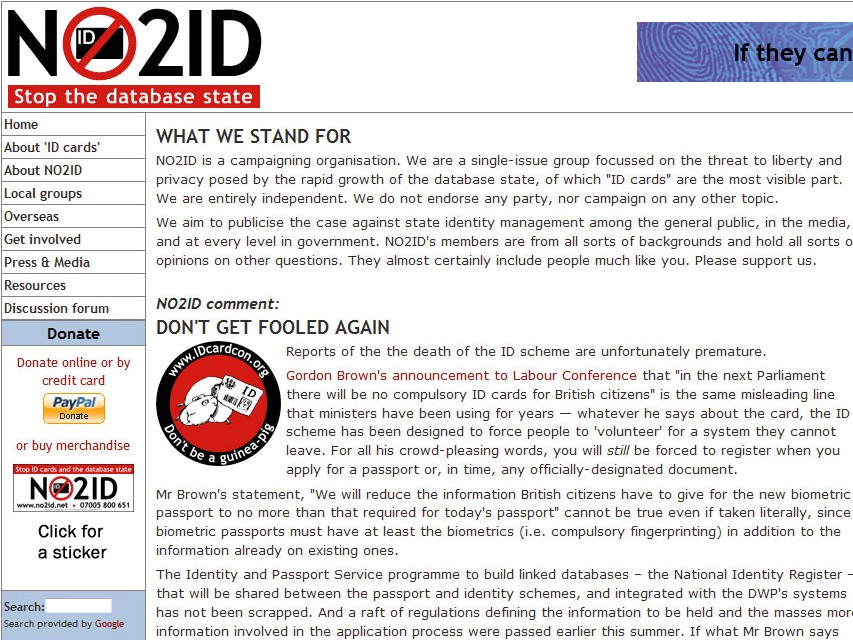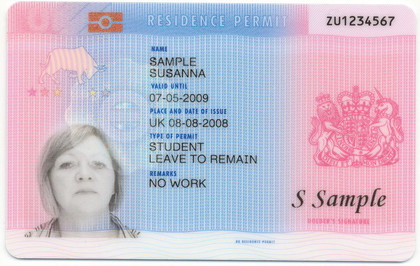
Just as the internet is quickly changing society, so it's also changing the nature of protest and the way campaigns of all kinds rally support for their causes.
A few short years ago, successful pressure groups needed massive organisation to catch the fleeting attention of the print or broadcast media.
Now, national support can be mobilised using email or social media websites. We talked to the organisers of two very different campaigns and discovered that the methods they use to communicate their message over the web depend as much on the qualities of the communities of potential supporters that they want to reach as it does on the causes themselves.
"I'm 32 years old, I've been using computers for all of my life. I've worked in an office, I'm a journalist, so I'm as connected to the internet as anyone is and it's second nature to me. But I'm one of those 10 per cent of people I'm not trying to reach," says Michael Parker, Press Officer for pressure group NO2ID. Finding that other 90 per cent is key to the success of the group's efforts.
"NO2ID is the national campaign against identity cards and the database state," says Parker. "We campaign against the growth of government-run mass information gathering and sharing of personal information from individuals, and storing all that information in databases and passing it around the public sector."
However, in a world fast coming to terms with social media technologies, NO2ID's methods are decidedly old-school. It's all to do with the nature of the campaign, says Parker.
"We've not really found a great deal of use [for social media] because the topics that we're discussing are not really the kinds of topics that journalists pick up off the Twitter feed and make a little story from," he told us. "They are, by their very nature, fairly abstract, fairly complicated and deal with non-concrete issues such as privacy and liberty, so they're not usually packageable into snappy stories."
Sign up for breaking news, reviews, opinion, top tech deals, and more.
Middle-aged support
The NO2ID campaign finds support in middle England, which is a decidedly less than tech-savvy section of society. "A huge number of our supporters, and indeed latent potential supporters, are middle-aged men and women living in the shires who aren't anything to do with the social media revolution, and quite potentially never will be," says Parker.
"The highly computer-literate, socially connected, media-savvy segment of society already know about us, and are already aware of privacy issues or of surveillance issues. It's the other 70, 80, 90 per cent that we need to reach," he adds.

ID FREE: Already introduced for foreign nationals, NO2ID campaigns for the abolition of ID cards
Despite the campaign's target audience, there's still a central role for the internet in coordinating the fight against the database state. "Everyone keeps in touch via the internet," says Parker. "We certainly use the internet, obviously as a communications tool, but it's very much a grass-roots 'boots on the ground' campaign."
However, through local group coordinators, NO2ID also runs a complex series of emailing lists that they use to inform everyone of events and developments.
Parker says that he's wary of becoming too reliant on the latest digital communications fads lest the campaign alienates supporters who are still coming to terms with being online. "[Social media users] are a very self-selecting chunk of the population," he says. "We are well aware that the majority of the country is not permanently plugged into Facebook, Twitter et al, and we want to reach those people, so our newsletter goes out by paper if you request it, and email as well."
Old-school success
That's not to say that individual supporters aren't free to use whatever communications technologies they want, however.
"Like other campaigns," says Parker, "it's a question of keeping people feeling useful and involved, handing out flyers and wearing the T-shirts just as much as lobbying their councillors – all that sort of grass-roots campaigning." That may mean emailing or even tweeting at councillors and MPs as well as setting up local web presences to get the message across.
Despite attracting less internet-aware supporters, the NO2ID campaign has scored a string of impressive successes. "We have several dozen councils that have passed motions essentially saying that they will, inasmuch as they are able to by law, refuse to cooperate with any national identity card scheme," says Parker.
"Some of them are even affiliated to NO2ID. Cambridge Council is affiliated to us, as are a number of others. And the Scottish Parliament, the Welsh Assembly and the London Assembly have passed that same motion.
"The campaign is trying to reach the 'everyman', and these people haven't got the slightest clue what Twitter is and even less interest [in finding out], I would say. But ours is a political campaign based on grass-roots support lobbying for change. In order to succeed, we need massive widespread support, and [social media] isn't a guaranteed way of getting it, so we need to use more than just the internet. We need to use word-of-mouth and traditional 'dead tree' industries to spread the message as well."
But while NO2ID needs to tailor its core use of the internet to reflect the online skills of its supporters, another campaign has discovered that the latest social media technologies give it access to legions of support that it never knew it had.